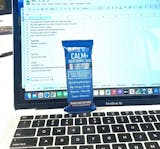Lion’s Mane Mushroom Extract
Lion’s mane mushrooms (Hericium erinaceus) are white coloured, large, shaggy mushrooms that resemble a lion’s mane. Asian countries like China, Japan, India and Korea have been using it for culinary and medical uses. While they are eaten raw, cooked, dried or steeped as a tea, their extracts are also used as health supplements.
|
Lion's Mane Mushroom Fast Facts
|
- Lion's Mane Improves Memory
- Reduces the Risk of Anxiety and Depression
- Lion's Mane Has Neuro-regenerative Abilities
- Lion's Mane Improves Sleep
|
Active Compounds
There are two active compounds of lion’s mane mushroom that are primarily responsible for improving brain function, viz. hericenones and erinacines. Hericenones help the brain produce more nerve growth factors. And erinacines easily cross the blood-brain barrier to boost the production of neurons. This aids in the formation of neural connections and maintenance of neural pathways responsible for cognitive function. The compounds interact with various parts of the brain and nervous system to improve our overall mental and physical state. Lion’s Mane also contains high quantities of beta-glucans and antioxidants that aid with immune support and general well-being.
Recommended Dose
Because human studies on Lion’s Mane are limited, no optimal dosage standard has been determined. Lion’s Mane dosage recommendations typically range from 500–3000 mg per day. Literature identified a variation in terms of the dosage used for cognitive benefits, as following: 750 mg/day of the mushroom, containing 96% dry powder was administered for 16 weeks; the mushroom in tablet form was administered as 3 g/day for 16 weeks; and 5 g/day of the fruiting body was consumed in soup.
Animal studies identified that lion's mane mushroom and its extracts are very safe, even at high doses. A study conducted to identify the cognitive benefits of the mushroom identified that 3000 mg of lion’s mane mushroom, consisting of a 96% of the pure extract was effective and well tolerated by research participants without any side effects. However, allergic reactions in humans have been reported, inferring that individuals with mushroom allergy shall avoid it. There have been documented cases of allergic reactions in people, after being exposed to lion’s mane mushrooms like difficulty in breathing and skin rashes.
Preference of One Form Over the Other
The preference for extract is due to the high concentration of bioavailable active compounds. The extracts are known to contain 15 times more beta-glucans than powders. These glucans are much easier to be absorbed by the body, since they are not bound to the rest of the mushroom. The extracts are also known to contain a very high amount of novel antioxidants than powders, thereby helping in combating the negative effects of oxidative stressors. Another main reason to choose extract over the powder is because extracts contain less impurities, which are especially important when mushroom supplements are chosen for a particular effect like adaptogenic.
General Benefits of Lion’s Mane Mushroom
Main benefits for Savvy
- Improves memory
- Reduces the risk of anxiety and depression
- Has neuro-regenerative properties
- Improves sleep
Benefits of Lion’s Mane Mushroom - according to science!
To make it easy to identify all the different studies - we will highlight them for you!
We really hope you enjoy our many years of research when formulating Savvy...
Lion's Mane Improves Memory
Rossi, P. et al. ‘Dietary supplementation of lion’s mane medicinal mushroom, Hericium erinaceus (agaricomycetes), and spatial memory in wild-type mice. International journal of medicinal mushrooms’. Volume 20. Issue 5. 2018 [Link]
In this study, lion’s mane mushroom was added to the diets of wild-type mice for 2 months, and effects on spatial memory were evaluated. It was found that oral supplementation with the mushroom yields specific and selective improvements in recognition memory without altering spatial working memory.
Ratto, Daniela, et al. ‘Hericium erinaceus improves recognition memory and induces hippocampal and cerebellar neurogenesis in frail mice during aging’. Nutrients. Volume 11. Issue 4. 2019. Pp. 715. [Link]
“Two-month oral supplementation with H. erinaceus reversed the age-decline of recognition memory.”
Younis, Noha Abd Al Kreem Younis. ‘Online Survey for Patient Outcomes on Hericium Erinaceus Mushroom.’ Pharmacognosy Journal. Volume 12. Issue 3. 2020. [Link]
In this study, an online survey was used to determine patients outcomes on the use of Hericium erinaceus. The benefits and satisfied outcomes were highest with participants who use H. Erinaceous in a dose of 2-3 tablets (3g) twice/day to improve memory and cognitive properties and lowest in the treatment of autism even with high doses.
Stamets, Paul. ‘Lion’s Mane: A Mushroom That Improves Your Memory and Mood?’. Huffington Post. Volume 8. 2020 [Link]
The memory impaired mice were fed with a diet containing 5% iof lion's mane mushroom for 23 days, following which significant performance in memory was noted, compared to control. Another cognitive skill, something comparable to curiosity was also found to improve.
"Lion's mane mushroom stimulates cognitive function and helps improve memory in rats, both with and without an alzheimer's model"
Spelman, Kevin, et al. ‘Neurological activity of Lion’s mane (Hericium erinaceus).’ Journal of Restorative Medicine. Volume 6. Issue 1. 2017. Pp. 19-26. [Link]
“In a behavior test on wild-type mice, oral supplementation with H. erinaceus induced a statistically significant improvement in spatial short-term and visual recognition memory”
Lion's Mane Reduces the Risk of Anxiety and Depression
Ryu, Sun, et al. ‘Hericium erinaceus extract reduces anxiety and depressive behaviors by promoting hippocampal neurogenesis in the adult mouse brain.’ Journal of medicinal food. Volume 21. Issue 2. 2018. Pp. 174-180. [Link]
This research paper evaluated whether H. erinaceus could reduce anxiety and depressive behaviors in the adult mouse and its underlying mechanisms. H. erinaceus (60 mg/kg) increased the proliferation of hippocampal progenitors. The results indicated that chronic H. erinaceus administration can exert anxiolytic and antidepressant-like effects, possibly by enhancing adult hippocampal neurogenesis.
Limanaqi, Fiona, et al. ‘Potential antidepressant effects of Scutellaria baicalensis, Hericium erinaceus and Rhodiola rosea.’ Antioxidants. Volume 9. Issue 3. 2020. 234. [Link]
“Anti-depressant effects”
Chong, Pit. Shan, et al. ‘Therapeutic potential of Hericium erinaceus for depressive disorder’. International journal of molecular sciences. Volume 21. Issue 1. 2020. Pp. 163. [Link]
This article critically reviewed the current literature on the potential benefits of the mushroom as a treatment for depressive disorder as well as its mechanisms underlying the antidepressant-like activities.
Vigna, Luisella, et al. ‘Hericium erinaceus improves mood and sleep disorders in patients affected by overweight or obesity: could circulating pro-BDNF and BDNF be potential biomarkers?’. Evidence-Based Complementary and Alternative Medicine. 2019 [Link]
“Eight weeks of oral H. erinaceus supplementation decreased depression, anxiety, and sleep disorders. H. erinaceus supplementation improved mood disorders of a depressive-anxious nature and the quality of the nocturnal rest.”
Yao, Wei, et al. ‘Effects of amycenone on serum levels of tumor necrosis factor-α, interleukin-10, and depression-like behavior in mice after lipopolysaccharide administration.’ Pharmacology Biochemistry and Behavior. Volume 136. 2015. Pp. 7-12. [Link]
This research study investigated whether amycenone, a compound obtained from the extracts of H. erinaceus, showed anti-inflammatory and antidepressant effects in an inflammation-induced mouse model of depression. Pretreatment with amycenone (200 mg/kg) significantly reduced depression scores, indicating antidepressant effects of the mushroom.
Lion's Mane Has Neuro-regenerative Abilities
Kushairi, Naufal, et al. ‘Lion’s mane mushroom, Hericium erinaceus (Bull.: Fr.) pers. suppresses H2O2-induced oxidative damage and LPS-induced inflammation in HT22 hippocampal neurons and BV2 microglia.’ Antioxidants. Volume 8. Issue 8. 2019. Pp. 261. [Link]
This study investigated neuroprotective and anti-inflammatory activities of H. erinaceus. The results indicated that H. erinaceus extract may be a potential neuroprotective and anti-inflammatory agent in the neuron-glia environment.
Nkodo, Amelie. ‘A systematic review of in-vivo studies on dietary mushroom supplementation for cognitive impairment (P14-021-19).’ Current developments in nutrition. Volume 3. Issue Supplement_1. Pp. nzz052-P14. 2019 [Link]
The results of this review found that dietary supplementation with lion's mane, reishi and cordyceps mushrooms may have a beneficial effect on cognitive impairment. The review discussed animal studies that found positive results on the effect of lion’s mane mushroom in reducing the onset of cognitive impairment.
Samberkar, Snehlata, et al. ‘Lion's Mane, Hericium erinaceus and Tiger Milk, Lignosus rhinocerotis (Higher Basidiomycetes) medicinal mushrooms stimulate neurite outgrowth in dissociated cells of brain, spinal cord, and retina: an in vitro study. International journal of medicinal mushrooms.’ Volume 17. Issue 11. 2015 [Link]
The aim of this study was to investigate the potential of H. erinaceus to stimulate neurite outgrowth in the brain and spinal cord. Lion’s mane extract at 50 µg/mL triggered neurite outgrowth at 20.47% and 22.47% in brain, spinal cord, inferring the neuroregenerative abilities of the extract.
He, Xirui, et al. ‘Structures, biological activities, and industrial applications of the polysaccharides from Hericium erinaceus (Lion’s Mane) mushroom: A review.’ International journal of biological macromolecules. Volume 97. 2017. Pp. 228-237. [Link]
“Neuroprotection and neuroregeneration”
Liu, Zongying, et al. ‘Systemic Screening of Strains of the Lion's Mane Medicinal Mushroom Hericium erinaceus (Higher Basidiomycetes) and Its Protective Effects on Aβ-Triggered Neurotoxicity in PC12 Cells.’ International journal of medicinal mushrooms. Volume 17. Issue 3. 2015 [Link]
“Fresh fruiting bodies of H. erinaceus had neuroprotective effects on PC12 cells”
Friedman, Mendel. ‘Chemistry, nutrition, and health-promoting properties of Hericium erinaceus (Lion’s Mane) mushroom fruiting bodies and mycelia and their bioactive compounds’. Journal of agricultural and food chemistry. Volume 63. Issue 32. 2015. Pp. 7108-7123 [Link]
“The reported health-promoting properties of the mushroom fruit bodies, mycelia, and bioactive pure compounds...nephroprotective, and neuroprotective properties and improvement of anxiety, cognitive function, and depression”
Lion's Mane Improves Sleep
Okamura, H, et al. ‘The effects of Hericium erinaceus (Amyloban® 3399) on sleep quality and subjective well-being among female undergraduate students: A pilot study.’ Personalized Medicine Universe. Volume 4. 2015. Pp. 76-78 [Link]
This research study assessed the effects of 4 weeks of administration of Amyloban® 3399 (a standard extract of H. erinaceus) on subjective well-being and sleep quality. The results revealed an improvement in anxiety and quality of sleep. In this study, Amyloban® 3399 was made based on a proprietary extract called “Amycenone”. It contains standardized amounts of the following compounds: Hericenone (0.5%) and Amyloban (6%).
Based on studies like those listed above, Savvy Beverages developed Savvy Mental Performance Coffee to boost brain function. It’s a delicious coffee with amazing added supplements for daily use to provide long-lasting mental energy, support brain function and enhance cognitive performance.
Each delicious Savvy Coffee provides a clinical dose of Lion's Mane Mushroom, to decrease stress and fatigue while boosting focus and improving mood. Savvy also provides complementary herbs, amino acids, vitamins, and minerals with high levels of evidence for cognitive enhancement.










